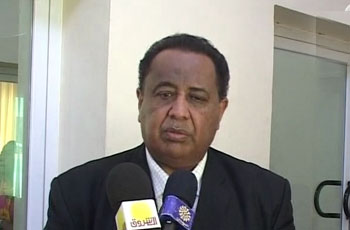Major presidential decisions on investments imminent: Sudanese official
January 17, 2014 (KHARTOUM) – The Sudanese presidential assistant, Ibrahim Ghandour, has disclosed that major presidential decisions and recommendations would be issued within a week particularly with regard to investment.

He acknowledged however, a decline in foreign investment, saying the government is aware of its reasons and working on resolving them stressing the government puts great emphasis on investments.
The presidential assistant further said the government is concerned with improving investment climate, stressing that political stability and sustainable economic policies are key requirements for attracting investments.
He added the government is aware of the problems encountered by Sudanese banks and described them as temporary, vowing a return to the old banking standards.
Ghandour also asserted the importance of pairing service and manufacturing projects in order to contribute to stability of the economy through reducing inflation rates and improving living standards.
He praised the role played by the private sector and said it endured economic fluctuations and did not transfer its investments and capital abroad.
The governor of the Red Sea state, Mohamed Tahir Aila, for his part, said his state’s doors are open for domestic and foreign investments in order to complete infrastructure projects, saying the Red Sea state enjoys security and stability that qualifies it for attracting investments.
He disclosed the existence of 14 mining blocs and the start of gold and iron production, announcing the completion of the first phase of the industrial city and providing additional 5,000 square meters in order to localize industry and increase exports.
Last November, the Sudanese investment minister Mustafa Osman Ismail acknowledged that inflows of Foreign Direct Investments (FDI) in the country have declined since the secession of the oil-rich south in mid-2011 compared to the prior decade.
He said that the biggest problem facing investment currently in the country is the land market and the exchange rate.
Sudan’s economy was hit hard since the southern part of the country declared independence in July 2011, taking with it about 75% of the country’s oil output. As a result Sudan had been unable to come up with hard currency needed by individuals or businesses who want to import or send profits overseas.
Other investors complain of unfavorable investment laws and bureaucratic hurdles they face when they come to Sudan.
(ST)
